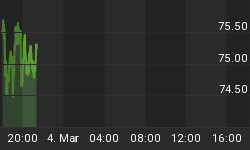Gold "Nearing Break-Out" as Obama Stimulus Judged "Too Small", CFTC Looks to Curb Crude Oil Trading
THE PRICE OF GOLD gained more than 1.0% for both US and UK investors on Tuesday morning in London, unwinding yesterday's losses as European stocks rose but volatility hit the currency markets.
As the price of Gold rose to $931.40 an ounce, government debt prices ticked lower and bond dealers reported "very little trading", pushing the yield on 10-year US Treasuries up to 3.55%.
The Euro bounced sharply towards $1.34, pushing the Gold Price for Eurozone buyers back down to €661, while crude oil bounced higher from a 6-week low of $64 per barrel.
"We believe the Dollar's status as reserve currency will be confirmed [at the G8 summit in Italy] on Thursday," writes Walter de Wet at Standard Bank today.
"Suggestions and comments by non-G8 member countries might un-nerve the market, but we see Dollar weakness on the back of such statements as an opportunity to sell gold."
"The market cannot be deemed bearish just yet," counters MKS Finance in Geneva. "The market will remain dull and range bound unless either the 920 or the 950 level is breached."
"The back and forth price action reflects some indecision," agrees Scotia Mocatta, the London market-maker today, "and cautions that a break-out is approaching."
Longer-term, however, "Any correction in the Gold Price [will be] short-lived given our belief that a tightening in the US monetary remains a distant prospect," says a new report from Deutsche Bank analysts Michael Lewis and Xiao Fu, who maintain their "mildly bullish outlook for gold into the second half of the year."
"We believe the macroeconomic environment remains broadly supportive for gold, namely negative US real interest rates when deflated by core CPI, skittish global equity markets, and a relatively weak US Dollar."
Overnight the State of California's debt rating was slashed to triple B by Fitch Ratings -- just two notches above "junk" -- after several major US banks said they will stop accepting its I.O.U. promissory notes in lieu of cash this coming Friday.
Facing a $24 billion budget shortfall for 2009, California plans to issue over $3bn of I.O.U.s to pay its creditors in July.
"Global investors and officials are concerned about the credibility and the sustainability of our fiscal policies. So am I," writes Richard Berner, managing director and chief US economist at Morgan Stanley.
"They fear that we will adopt policies that will undermine the Dollar and the domestic value of dollar-denominated assets through a combination of risk premiums and inflation...Interest rates may have to rise significantly to compensate investors, including reserve portfolio managers and sovereign wealth funds."
Investors looking to defend against inflation with crude oil or commodity-index positions may find their speculation capped by new restrictions, US regulator the Commodity Futures Trading Commission said today.
CFTC chairman Gary Gensler announced hearings to decide whether "federal speculative limits should be set to all commodities of finite supply, in particular energy commodities, such as crude oil, heating oil, natural gas, gasoline and other energy products.
"This will include a careful review of the appropriateness of exemptions from these limits for various types of market participants."
Today US advisor Laura Tyson joined vice-president Joe Biden in calling the Obama government's $787 billion stimulus package "a bit too small".
Latest CFTC data showed Monday night that the outstanding number of US Gold Futures and options ticked higher as the Dollar Gold Price added 1.5% in the week to last Tuesday.
The net long position held by speculative traders fell to a 7-week low, but the "smart money" of commercial industry players raised its bearish betting faster than its bullish position in gold, pointing to caution amongst refiners, wholesalers and bullion banks as the seasonal summer lull in Buying Gold wore on.
"At the moment, the safe haven money is more directed into bonds and the Dollar because of the low inflation level," reckons James Steel, head of commodities analysis at HSBC in New York.
Noting that Gold Prices were left unmoved by weekend news of rioting in China and fresh ballistic missile tests by North Korea, "Such indifference by gold to ostensibly bullish events may be an indication of underlying weakness," he believes.
Meantime in India, the traditional summer lull in gold and silver demand has been compounded by yesterday's doubling of precious-metal import duties, LiveMint reports from Mumbai.
"The duty hike is holding traders back now," says IndusInd Bank's Pinakin Vyas. "We will not be able to achieve targeted imports due to this duty."
"The weak Rupee following the [new Indian] budget also dented demand," another bank dealer tells the website.
"Evidence from other key gold markets around the world [says] higher taxation regimes can lead to the trading of gold along non-official channels," warns World Gold Council director Dharmesh Sodah, quoted by Bloomberg.
Over in Vietnam -- where the lifting of gold-export restrictions flattered the Jan-July trade balance by US$2.6 billion -- gold demand is rising "in dribs and drabs" as local prices tick down, says VietNamNet Bridge, cutting the 2.5% premium to world prices seen late last month.
The Solidarity trade union in South Africa, formerly the world's No.1 Gold Mining producer, warned yesterday against calls by militant politicians to nationalize the nation's mineral assets.
"The statements that are now being made and the [ruling party] ANC's current support for debate are an ominous sign," said Solidarity spokesman Jaco Kleynhans. "The statements could not have come at a worse time.
"Commodity prices have dropped sharply and nearly 35,000 employees in the industry have already lost their jobs this year. Mining companies hate uncertainty and serious investors will not invest in South African mining."
South Africa's annual gold output has more than halved in the last decade.
Last week the government began temporarily closing selected operations in a bid to stem fatalities in the industry, already running at 277 over the last 12 months.















